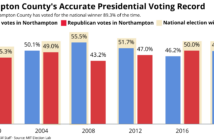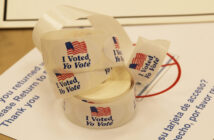With overtime winding down, Chiefs quarterback Patrick Mahomes rolled to his right to find wide receiver Mecole Hardman open in the end zone, clinching another legacy-defining Super Bowl win. The magically-crafted red zone play that gave the Chiefs their third Lombardi trophy in five years marked a signature victory for America’s new beloved power: Chiefs tight end Travis Kelce and Taylor Swift. But also President Biden?
Just minutes after the game concluded, Biden (or presumably one of his aides) took to his personal Instagram account for what appeared to be a tongue-in-cheek victory lap on the conservatives who declared “war” on Swift and her incomprehensibly large following. The post featured Biden with glowing red eyes or what is known in hyper-online circles as the “Dark Brandon” meme.
“Just like we drew it up, @Chiefs,” said the caption on Biden’s Instagram post.
Similar to how the Chiefs defeated the 49ers, Biden enthusiastically clapped back at conservatives in this round of the evergoing culture war.
But do voters really care?
There’s nothing wrong with politicians integrating pop culture into their campaigns to capitalize on moments that have Americans’ attention. Politics and pop culture have always been deeply connected, but that connection has evolved into full conflation.
Politicians are now obligated to position themselves as for or against ultimately inconsequential matters from the emergence of “Swifties” into the NFL world to the green M&M’s design changes.
Up-and-coming conservative voice Vivek Ramaswamy, who suspended his 2024 presidential campaign in January, exemplified the politicization of pop culture in a post on X (formerly Twitter) prior to the Super Bowl.
“I wonder who’s going to win the Super Bowl next month,” Ramaswamy said. “And I wonder if there’s a major presidential endorsement coming from an artificially culturally propped-up couple this fall.”
Not only are pop culture hot takes like Ramaswamy’s and many others senseless; they haven’t proven to be an effective electoral tool either.
Just ask Florida Governor and former Republican presidential candidate Ron DeSantis about how his strategy of attacking transgender rights, banning books and removing the word “gay” from schools fared for his campaign.
In a CBS poll, when asked if books should ever be banned for “depicting race” or “discussing slavery” 87% of Americans said no. These extremist opinions from DeSantis and politicians like him are firmly unpopular among Americans.
But since a presidential candidate propagates these ideas, it becomes newsworthy enough to take coverage away from real problems that are on the ballot this fall.
Frankly, when politicians expand the culture war’s presence, it undermines the legitimacy of the presidential election and attempts to distract voters from what they really care about.
Voters care about abortion access. Voters care about climate change. Voters care about the economy and their relation to it. When politicians lose focus on these issues to instead focus on things with more cultural salience, it’s a slap in the face.
Both the incumbent, Biden, and Republican challenger, Donald Trump, should learn from the failed DeSantis campaign’s obsession with fringe issues. It is our job as voters to constantly remind them why people vote in the first place.
While voters and politicians are partly responsible for strengthening culture wars, the media is far from blameless in the overrepresentation of frivolous storylines.
An example of this phenomenon is how Biden’s “Dark Brandon” moment overshadowed what ostensibly was Biden’s most important news story that night.
During the Super Bowl, the American-funded Israeli Defense Forces carried out a bombing raid on the densely populated city of Rafah in the Gaza Strip, killing 67 people according to the Gaza Health Ministry. Biden has continuously opposed calling for a ceasefire in the Israel-Gaza conflict, disregarding its popularity among Americans and Democrats in particular.
Much of the talk about Biden on the night of Feb. 11 was focused on him embracing the Swift/Kelce controversy, even though his foreign policy in the Middle East was playing out in real time.
Again, all of this is not to say pop culture has no place in politics. Pop culture always has and always will play a part in shaping the democratic will of a moment.
Still, these issues should not be taking center stage while international tensions and pressing environmental issues take a back seat.
It is on us as voters to not let our elected officials off the hook by allowing them to escape into the realm of cultural back and forths. Election Day is drawing near, and we can not allow our political conscience to get off track with so many important issues hanging in the balance.






Comment policy
Comments posted to The Brown and White website are reviewed by a moderator before being approved. Incendiary speech or harassing language, including comments targeted at individuals, may be deemed unacceptable and not published. Spam and other soliciting will also be declined.
The Brown and White also reserves the right to not publish entirely anonymous comments.